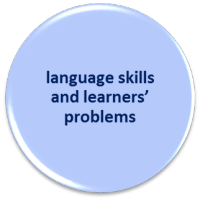Delta Module One Course
 |
Syllabus area 4
|
 |
This section of the syllabus covers these areas and you should be able to:
|
To be able to do this you need a knowledge of these areas. The following and the guides linked from here are those on this site which cover the areas. You should follow those you need and then return to this page to try some tests of your knowledge.
 |
An overview of what you need to know |
This is another large area of the syllabus because you are being asked to know about all skills and all the possible issues that can arise when learning, applying or teaching the skills. Then you are asked to consider the methodological implications of the issues.
There is more to using a language than knowing about its systems
and its lexis. We need to be able to teach people how to
deploy this knowledge by using language to achieve their aims.
It is here that the specific and explicit teaching and development
of the four main skills comes into play.
Although there are considerable differences between the receptive
and productive skills as well as between reading, listening, speak
and writing, there are also commonalities in terms of the ways we
process information and the ways we communicate information.
For example, a knowledge of formality, hedging, modality and
register-specific language will aid both speaking and writing
appropriately but will also inform the ways we understand what we
read and hear.
It is also true that a knowledge of how to approach listening to or
reading a foreign language will inform how we structure writing and
speaking.
These guides are intended to help people understand the distinctive
features as well as their interconnections and commonalities.
 |
Time presses |
You probably have limited time and there are lots of guides in
the list below. You need to focus on the skills with which you
are the least familiar first and, if you have time, come back to the
others.
To help you identify what you need to know, try this task:
 |
|
Now click here for the answers and some comments.
- Teaching writing skills can be approached in three main
ways (and they may be combined). They are:
a) A product approach which focuses on the outcomes of writing. It often requires an analytical approach looking at the language structures that are needed, the lexis the learners will have to use and the style they need to adopt. Frequently, a model text is presented and analysed first.
b) A process approach which focuses on the subskills of writing and involves brainstorming ideas, drafting, first writing and so on.
c) A genre approach which first analyses a model text and seeks to alert learners to the writer’s overall intention within the cultural norms of the language, the way the information is conventionally staged, how the language contributes to the tenor of what is written and how items such as verbs and adverbials function to support the text. This is often combined with either (or both) of the first two approaches.
If this paragraph gave you trouble select the guide below to writing and teaching writing. These are quite basic ideas. - Many spoken interactions may be divided into three
phases (sometimes referred to as IRF). They are:
Initiation in which a speaker informs, asks if, requests or elicits.
Response in which the speaker chooses to conform (the preferred tactic), not to conform (dispreferred) or to temporise.
Follow-up in which one speaker signals that exchange is complete by endorsing, conceding or acknowledging the outcome.
If this paragraph gave you trouble select the guide below to speaking and teaching speaking. These are quite basic ideas. - Reading to locate a specific item of data is often
referred to as scanning. When listening, we do much
the same sometimes but spoken texts are ephemeral so we have
to monitor
instead.
Follow the guides to listening and teaching listening if this is new to you. - When we read, in addition to scanning, we may deploy
three other subskills. They are:
Skimming in which we are just looking for the general message of the text.
Intensive reading in which we are concerned to understand as much as possible.
Extensive reading in which we are reading for pleasure or general interest and may skip passages and items we don’t understand.
If this paragraph gave you trouble select the guide below to reading and teaching reading. These are very basic ideas. - Receptive skills teaching can be approached in two main
ways:
Bottom-up processing requires us to decode the language we read or hear at the level of letters, phonemes, words, phrases, clauses, sentences and whole texts.
Top-down processing requires us to draw on our knowledge of the text type, the world in general and the communicative purposes of the maker of the text.
If you are not aware of this very fundamental difference, you need to follow the guides to receptive skills.
Here is a list of all the guides relevant to this area. From the skills index (new tab), there are links to teaching and assessing in the area.
| Syllabus areas | Guides to these areas |
|
Features of language skills (e.g.
in terms of subskills, strategies) and associated texts
(e.g. in terms of genre, complexity, intended audience) and
terminology; application of analysis to teaching purposes (The first link on the right takes you to an overview concerned with teaching language skills in general.) |
Teaching language skills |
| Reading skills | |
| Writing skills | |
| Speaking skills | |
| Listening skills | |
| Problems
learners face in achieving success in skills work (All the skills guides cover this area in one way or another but the links here are helpful in terms of bottom-up processing.) |
Phrase structure |
| Clause structure | |
| Syntax: phrases, clauses and sentences index | |
| Literacy in different ELT contexts | Style and register |
| Cohesion | |
| Shell nouns | |
| Genre analysis | |
| The index to guides to English for Academic Purposes | |
| Reference sources for skills analysis | Skills references |
 |
Where next? |
Once you have worked your way through the guides and
done some research,
it's time to test your knowledge in these areas and then do
some revision exercises.
If you have followed the guides in the skills analysis sections,
you'll have done lots of tests along the way so there are a few
repeated here and a few new ones.
Here are the choices:
| A set of tests | to check what you can remember. Do these first. |
| Revision course index | there is a section of the Delta Module One Revision Course for this area of the syllabus |
| Examination practice | apply the knowledge you have gained to practising for the examination (new tab) |
 |
 |
| course index | exam practice |
